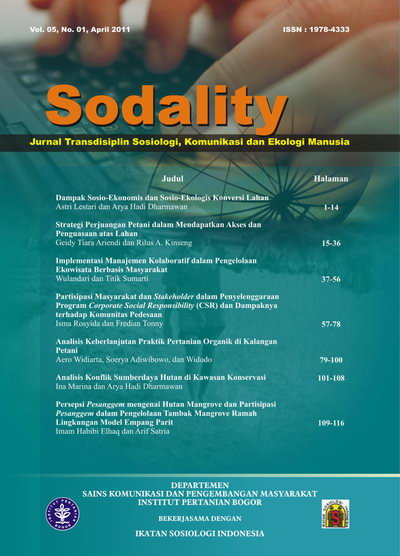DAMPAK SOSIO-EKONOMIS DAN SOSIO-EKOLOGIS KONVERSI LAHAN
DOI:
https://doi.org/10.22500/sodality.v5i1.5835Abstract
Conversion of agricultural land is one of the phenomena of change the agricultural land designated into non agricultural designated. The purposes of this study are 1) to know the types of land conversion at Desa Tugu Utara, 2) to know the social-economic impact of land conversion at Desa Tugu Utara, and 3) to know the social-ecological impact of land conversion at Desa Tugu Utara. This study uses a quantitative approach supported by the use of qualitative approach. The result of the study showed that the type of land conversion in the village (2000-2010) consists of three types of land conversion: 1) land conversion type by location (open/closed), 2) land conversion type by the speed of change of land utilization (fast/slow), and 3) land conversion type by the actors involved in the land conversion (local residents/non-local resident). In general, land conversion gives a negative impact on social-economics conditions of household in the region, either in the agricultural sector or in the non- agricultural sector and also brings a negative impact on social-ecological system because it causes many environmental degradation.Downloads
Published
2011-04-11
Issue
Section
Articles
License
Authors who publish with this journal agree to the following terms:
- Authors retain copyright and grant the journal right of first publication with the work simultaneously licensed under a

This work is licensed under a Creative Commons Attribution 4.0 International License. that allows others to share the work with an acknowledgement of the work's authorship and initial publication in this journal. - Authors are able to enter into separate, additional contractual arrangements for the non-exclusive distribution of the journal's published version of the work (e.g., post it to an institutional repository or publish it in a book), with an acknowledgement of its initial publication in this journal.
- Authors are permitted and encouraged to post their work online (e.g., in institutional repositories or on their website) prior to and during the submission process, as it can lead to productive exchanges, as well as earlier and greater citation of published work (See The Effect of Open Access).
How to Cite
Astri Lestari, A., & Hadi Dharmawan, A. (2011). DAMPAK SOSIO-EKONOMIS DAN SOSIO-EKOLOGIS KONVERSI LAHAN. Sodality: Jurnal Sosiologi Pedesaan, 5(1). https://doi.org/10.22500/sodality.v5i1.5835












.png)

